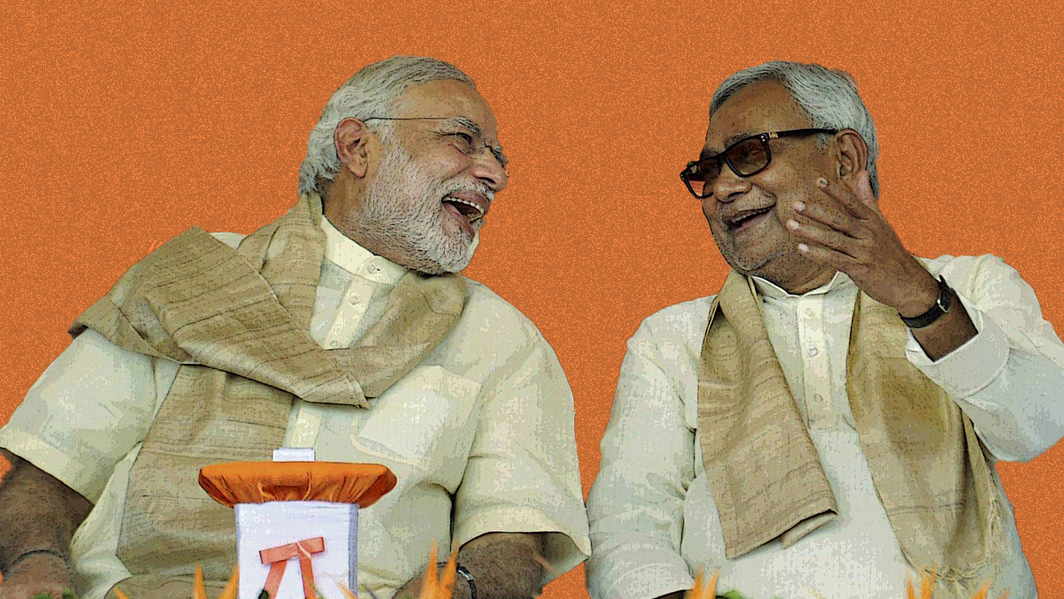[vc_row][vc_column][vc_column_text]Winning the trust vote with a comfortable margin, Nitish Kumar started his second term as chief minister in the same State Assembly on Friday. This is the fifth time the 66-year-old has become CM in his 40 years of life in active politics.
The newly sworn-in CM won the trust vote on Friday in the Bihar Assembly with 131 votes in favour of the JD(U)-BJP alliance; 108 MLAs voted against the motion. The NDA had earlier submitted a list of 132 MLAs to the governor. These include 71 of JD(U), BJP 53, RLSP 2, LJP 2, HAM 1 and 3 Independents. In the rival camp, the RJD has 80 MLAs, the Congress 27 and the CPI-ML has three.
Four legislators did not vote, two on technical grounds and one calling sick. Two of the four independent legislators voted for Kumar in the House of 243.
There was no cross-voting, the Speaker Vijay Kumar Choudhary’s rejection of RJD and Congress’ demand for a secret ballot ensuring that voting was strictly on party lines. A lobby division method was opted for. Legislators went of the House and came back one by one and signed a register indicating their vote, for or against the motion.
A political survivor who has managed to stay in office by tying up with whichever party seems to be carrying the day, somewhat like the other Bihar politician and Union Consumer Affairs Minister Ram Vilas Paswan, Kumar insisted while seeking the trust vote that he changed sides for “sewa” (service) and not “mewa” (fruits of power).
“To be in power devolves great responsibility to govern, not earn. Yeh sewa ka Avsar hai, na ki mewa ka (It is an opportunity to serve, not profit,” he said before seeking the trust vote.
Two days ago, he had dumped coalition partners, the RJD and Congress. “I faced lot of resistance trying to run the government in the best interest of people of Bihar and preserve the mahagathbandhan, but failed due to RJD’s attitude,” said Kumar.
He chose to quit over his deputy chief minister and RJD chief Lalu Prasad’s son Tejashwi Yadav neither resigning nor explaining to the people the corruption charges against him being investigated by the CBI.
Less than two years ago, Kumar had ignored several cases of corruption against Prasad. However, Kumar probably realised that Lalu Prasad was grooming his son for post of CM and his position at the top was doubtful in future in the alliance even as, for him, it was leading to diminishing returns for him. He used the excuse of allegations of corruption against Yadav’s son, Tejashwi Yadav, to break the Grand Alliance. Kumar’s decision was likely made keeping the 2020 Bihar Assembly elections in mind.
Former ally BJP, with which he ran a previous coalition government till 2013, immediately offered him support and he was sworn in again as CM with BJP leader Sushil Kumar Modi as his new deputy on Thursday. Governor Keshari Nath Tripathi ased him to prove his majority on the floor of the House within two days, a condition that was met today.
His action dealt a blow to the strength and unity of Opposition, while giving further boost to the image of BJP as a fast-acting, decisive party under the strong and popular leadership of Prime Minister Narendra Modi. The Congress came out as a floundering party with an incapable leadership.
Modi congratulated Kumar immediately after the trust vote. “I am happy that the CM did not give in and took a step”, Modi said, referring to the corruption charges. Taking a dig at Tejashwi, Modi said, “Today Tejashwi did not say a single word on corruption in the assembly. People of Bihar want to know how has he earned so much money at an age of 28 years?”
About Mahagathbandhan, he said, “If they had votes, they should have proven it in the Assembly. It has been proved that the JD(U)-BJP alliance has full majority. Unnatural alliance died naturally. Within months, the alliance has split.”
Sushil Kumar Modi, the deputy chief minister who replaced Tejashwi, said, “I thank the Congress and the RJD for not asking Tejashwi to resign. Had that happened, I would not have been on the right side.”
“If the RJD insists that the mandate was not followed, it should introspect, whether it was for the likes of Mohammad Shahabuddin and Rajballabh Yadav? It is better now, that the government is in right hands,” he said, referring to two controversial aides of Lalu Prasad.
“The new government will register fresh milestones in successful governance, which was lacking in the last regime due to RJD’s intransigence,” he added.
Before the vote, Opposition leader and former deputy chief minister, Tejashwi Yadav, made an emotional speech, dismissing corruption charges against him were cooked up.
“Is there any charge against me in the last 20 months of impropriety during my tenure in office?… If it was about corruption, the JD(U) should not have allied with my father, who was facing cases; yet it happened,” he said.
“There is just an FIR, not a proved case; so where was the question of my resignation?” he added referring to the controversy over his refusal to quit that led to Kumar pulling of the grand alliance. “The chief minister never ever asked for my resignation either,” he said.
“I am young. Only 28. It was my success, which unnerved the JD(U), which plotted for my removal,” he said, adding that Kumar was aware of his “honesty”, said Tejashwi.[/vc_column_text][/vc_column][/vc_row]


 India News11 hours ago
India News11 hours ago
 India News11 hours ago
India News11 hours ago
 Cricket news11 hours ago
Cricket news11 hours ago
 Latest world news11 hours ago
Latest world news11 hours ago
 Latest world news8 hours ago
Latest world news8 hours ago
 LATEST SPORTS NEWS5 hours ago
LATEST SPORTS NEWS5 hours ago













